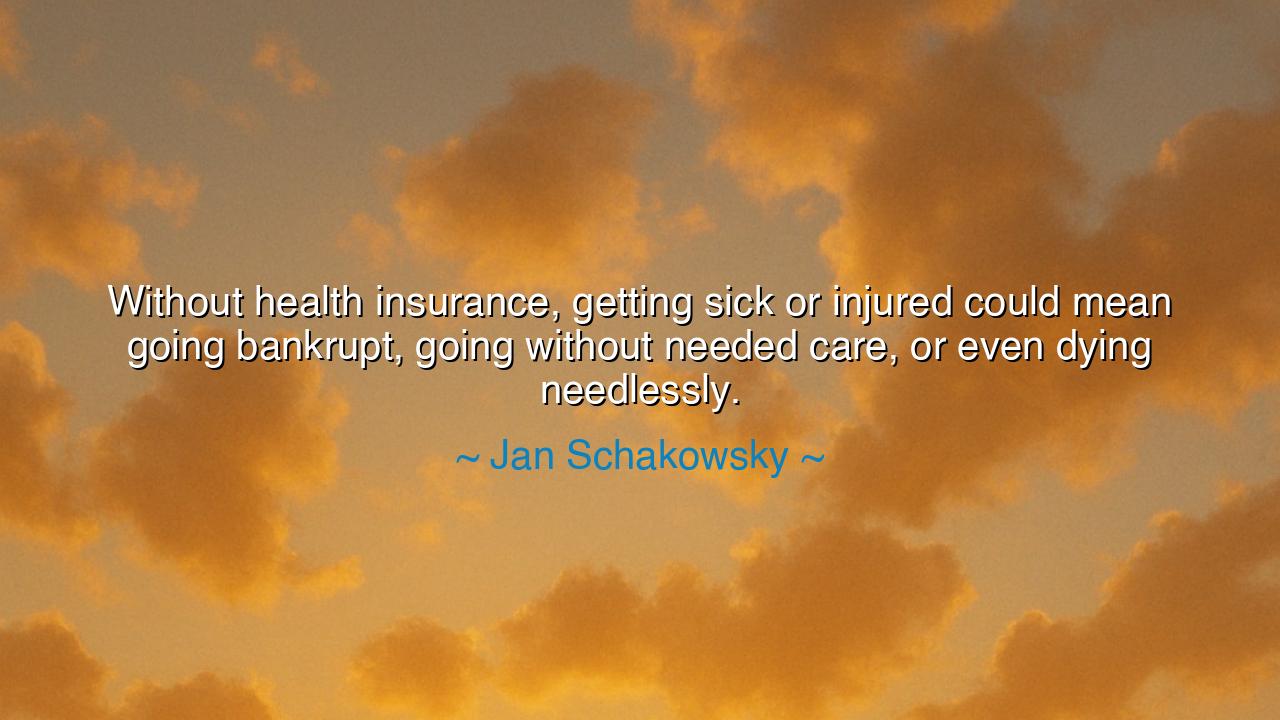
Without health insurance, getting sick or injured could mean
Without health insurance, getting sick or injured could mean going bankrupt, going without needed care, or even dying needlessly.






In the words of Jan Schakowsky, a voice raised in defense of the vulnerable, there rings a truth both sobering and sacred: “Without health insurance, getting sick or injured could mean going bankrupt, going without needed care, or even dying needlessly.” These words are not born of abstraction, but of compassion — the kind that sees the suffering of the people and refuses to turn away. In them lies a cry for justice, a reminder that health is not a privilege but the foundation of human dignity, and that a society is measured not by its wealth, but by how it guards the lives of its weakest members.
To the ancients, the body was the temple of the soul, and to preserve it was a moral duty. They built baths and sanctuaries, temples of healing, and systems of care long before the word “insurance” was known. Yet even they would understand Schakowsky’s plea — that in our modern age, where medicine has the power to save but the cost to destroy, the lack of protection against illness can be as deadly as the disease itself. For what use are the miracles of science if they are locked behind gates of gold? What is the worth of progress if it cannot reach the people?
The truth in Schakowsky’s words is written in the stories of millions. Consider the tale of Elizabeth, a young mother in the heart of America, who fell ill with pneumonia and, lacking health insurance, hesitated to seek care. By the time she reached the hospital, the infection had spread; her treatment came too late. She survived, but the debt that followed swallowed her home and her savings. Her story is not one of rare misfortune, but of a system that values profit over protection. Like countless others, she learned that illness can strike not only the body, but also the stability of life itself — for without coverage, even a simple sickness can unravel the tapestry of existence.
In ancient Athens, the philosopher Plato declared that the city’s health is bound to the health of its citizens. A state that allows its people to suffer without aid, he said, is a state that decays from within. To heal one is to strengthen all. And so it remains today: when one person is denied care, when a family is crushed by medical debt, it is not only their tragedy — it is the wound of a nation. Schakowsky’s warning is not merely about policy, but about the moral fabric of civilization itself.
For what is more needless than a preventable death? What is more tragic than a cure withheld not by science, but by circumstance? The ancients wept for those lost in plague and war; how much more should we grieve when a life is lost to paperwork and price? A civilization that permits such suffering in the name of profit stands in defiance of its own humanity. To ensure access to care, to guard against ruin when sickness comes, is not an act of charity — it is an act of justice, of wisdom, of love for the human condition.
And yet, Schakowsky’s words are not merely lament; they are a call to action. They bid us remember that health is a communal good, and that the wellbeing of one sustains the many. No person is an island, and illness does not respect wealth or rank. The teacher, the farmer, the worker, the elder — all walk beneath the same sky of uncertainty, and all deserve the shelter of care. The wise understand that to build a system of protection is not to weaken the strong, but to fortify the whole.
The lesson, then, is this: value the health of your neighbor as your own. Support the systems that preserve life and prevent despair. Speak for those whose voices are drowned by hardship, for the right to health care is the right to live without fear. Do not measure worth by wealth, but by the strength of compassion that flows through the heart of your society. For when one person’s sickness becomes a sentence of ruin or death, all humanity bears the shame.
So remember, O listener of wisdom: without health insurance, one illness can steal not only breath but hope. To secure it for all is to bind the nation with cords of mercy and strength. Let this be your creed — that no one shall perish needlessly, that no one shall choose between medicine and survival. For in the eyes of the wise, the greatest wealth is not gold nor power, but the enduring gift of health, guarded and shared by all.






AAdministratorAdministrator
Welcome, honored guests. Please leave a comment, we will respond soon